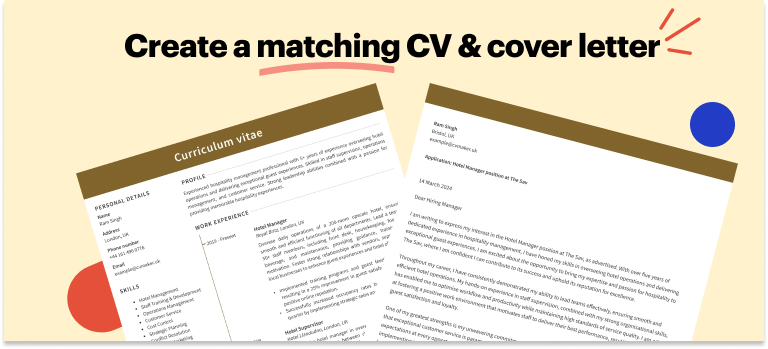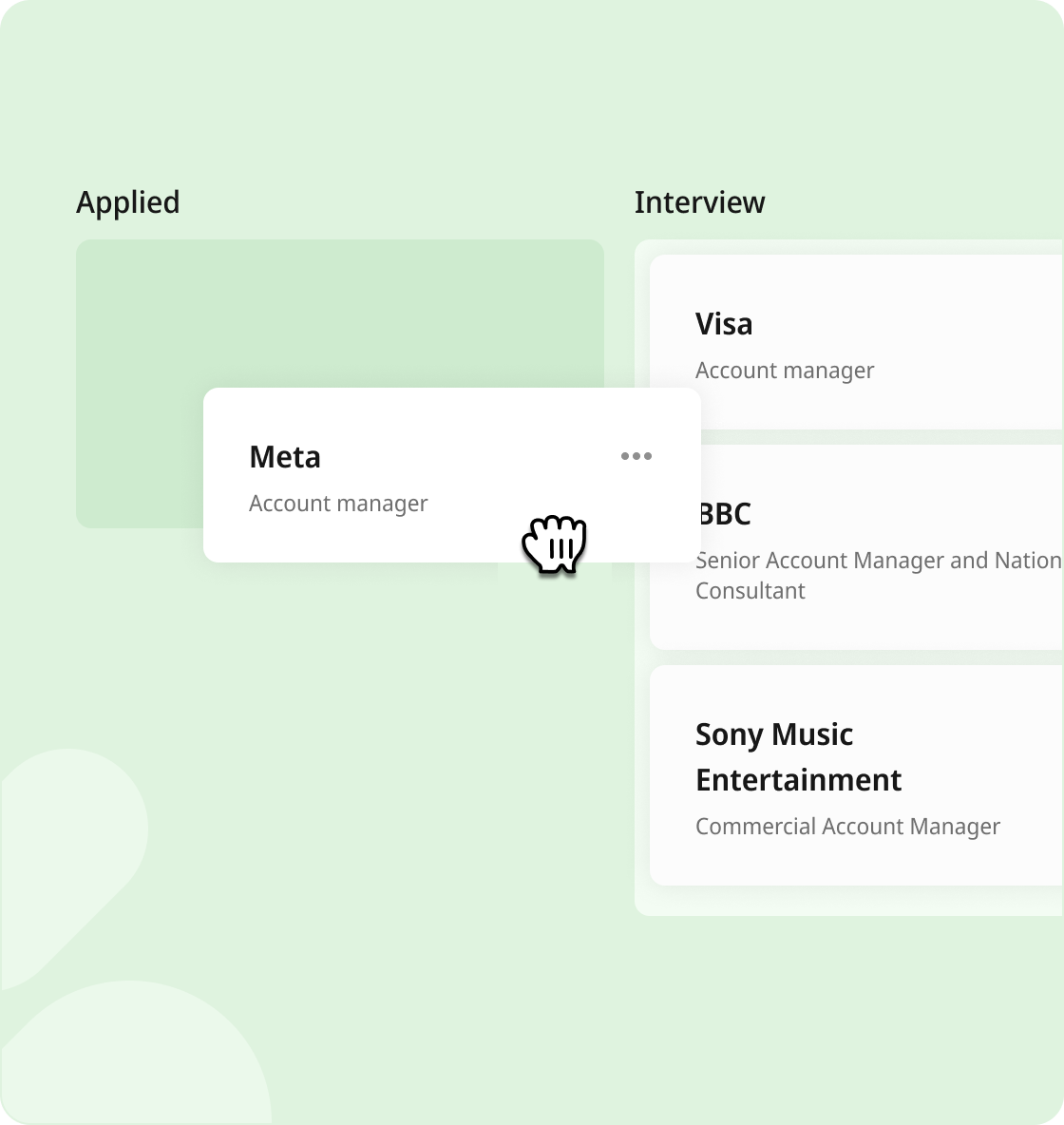Looking for a job can feel like navigating a maze of applications, deadlines, and uncertainties. In this whirlwind, staying organised is a must. Without a clear record of your applications, it’s easy to lose track of which positions you’ve applied for and when to follow up. This can lead to missed deadlines and confusion, ultimately undermining your confidence. By adopting a systematic approach to tracking your job applications, you can stay organised, focused, and ready to seize new opportunities in the year ahead.
However, keep in mind that sending generic CVs can hurt your chances of success. Tailoring your applications to each role shows interest and highlights relevant skills, helping you stand out. Tracking applications is crucial for landing more interviews, but creating a master CV and job-specific versions is just as important.
Stay organised with the Job Tracker
Track your progress at a glance
Move applications easily through each stage
Keep notes, dates, and links in one place
Attach tailored CVs and cover letters with a click
Simplify your job search
Enhance your job application with CVMaker, the go-to platform for jobseekers, offering professional CV templates that can be tailored to your career goals.
8 tips on how to track job applications
A job application tracker has become essential in today’s fast-paced job market, particularly as applicant tracking systems (ATS) advance rapidly alongside AI technology.
The significance of a good CV and a good cover letter cannot be overstated. Even if you choose to use AI for your CV, human input remains crucial in the job search process. By following these tips, you can ensure that your job application stands out and that you don’t miss any opportunities.
1. Create a centralised system
Start by establishing a centralised system to track your job applications. This could be a spreadsheet, a dedicated notebook, or a digital task management tool. Include columns or sections for essential details such as job title, company, application deadline, status, and any follow-up actions required. If you are using a table layout, keep it as simple as the following:
| Job | Applied | Not yet applied | CV | Cover letter |
|---|---|---|---|---|
| Link | Yes | - | CS CV | CS CL |
| Link | Yes | - | AM CV | AM CL |
| Link | - | In progress | Sales CV | To be created |
For your job application tracker, we suggest tailoring it to suit your job targets, perhaps incorporating additional details such as the following:
Position: Include the job title with a hyperlink for easy access.
Location: Specify the geographical location of the job and indicate if it's remote or hybrid.
Contact information: Provide the name of the recruiter or hiring manager along with their precise title.
Application status: Track whether you have applied or not yet applied. This allows you to better organise your job search efforts.
Date of application: Adding this field provides insight into when to follow up and analyse application responses.
Interview details: Extend this into multiple columns for different interview phases and specify the type (phone interview, in-person) along with the respective dates.
CV: Specify which CV you used, and ensure it is tailored to the role.
Cover letter: Customise your cover letters to enhance your application's impact. Be sure to note which cover letter you included, as these are typically very specific with company details and job information.
Additional notes: Provide space for any extra details or reminders related to the application process.
2. Set clear goals
Define your career goals and objectives to guide your job search efforts. Identify the types of roles and industries you're targeting, as well as any specific companies of interest. Clear goals will help you narrow your search and focus your efforts on relevant opportunities.
For example, if you are targeting jobs within the hospitality sector, ensure your hospitality CV and hospitality cover letter are aligned and emphasise key details to make your CV stand out.


For more inspiration, feel free to delve into these matching CV and cover letter samples:
3. Research thoroughly
Take the time to research potential employers and job openings thoroughly. Evaluate company culture, mission statements, and job descriptions to determine if they match your values and skills. Keep notes on each company and role to reference during the application process.
While some individuals may be content with any job opportunity, for others, the company's culture holds significant importance. If you are driven by a passion for sustainability or helping others, ensure that the positions you apply for align with your core values.

Explore our guides tailored for these roles to enhance your job search experience:
4. Customise your applications
Tailor your CV and cover letter to each job application to highlight your qualifications and fit for the role. Referencing specific job requirements and incorporating relevant keywords can increase your chances of catching the employer's attention.
Example of keywords for an estate agent cover letter
Pro Tip
Create a good filing system using straightforward naming conventions for easy tracking. This ensures seamless retrieval and monitoring of your CV and cover letter versions.
5. Follow up regularly
After submitting an application, make a note to follow up with the employer if you haven't heard back within a reasonable timeframe. Use your job tracking system to schedule follow-up reminders and document any communication with hiring managers or recruiters.
6. Stay organised with networking
Networking is an essential aspect of the job search process. Keep track of your networking activities, including meetings, events, or job fairs attended, and connections made. Cultivate relationships with industry professionals and leverage your network for job referrals and recommendations.
Pro Tip
Ensure your LinkedIn profile is current and aligns with the information presented in your CV and cover letter.
For more tips, refer to our article on how to improve your LinkedIn profile.
7. Stay persistent and flexible
Job searching can be challenging and unpredictable, so staying persistent and flexible is essential. Keep refining your approach based on feedback and market trends, and don't get discouraged by rejections. Celebrate small victories along the way and maintain a positive mindset throughout your job search!

8. Keep your job hunt on track with CVMaker's Job Application Tracker
If you’re looking for a customisable and easy-to-use tool to stay organised, our Job Tracker is here to help you navigate this complex process and take control of your job hunt.
![]()
How does it work?
Move applications easily through each stage of your application process (prep, applied, interview, feedback).
Keep notes about the position, contact person, dates, and links to the job descriptions in one place.
Attach job-specific CVs and cover letters.
Job application tracking essentials
Take proactive steps towards being organised so that you can navigate the complexities of the job market confidently and efficiently.
Job tracking is key to effective time management, helping you set aside focused periods to explore new opportunities.
Maintain a clear overview of your progress and the status of each application.
Tailor your CV and cover letter to specific roles and companies, increasing your chances of standing out as a strong candidate.
Next steps?
We offer a range of CV templates and an extensive library of CV examples and cover letter examples that can be tailored to suit your individual preferences. Alternatively, if you are looking for expert advice, our CV Writing Service might be the option for you.
FAQs
How do I keep track of my job search?
To effectively track your job search, consider using a mix of digital tools and traditional methods. Utilise calendars or planners to schedule follow-up dates, interviews, and networking events, and complement this with spreadsheets or job search tracking apps to organise your applications and monitor your progress.
Does it help to follow up on a job application?
Absolutely! Following up shows your proactive attitude and genuine interest in the position. It also reinforces your qualifications and enthusiasm for the role, helping to keep you at the forefront of the employer's mind amid other candidates.
What is job search tracking?
Job search tracking involves systematically monitoring and managing your job search activities. This includes not only submitting applications, but also keeping track of networking efforts, attending career fairs or interviews, and following up on leads or referrals to stay organised and focused on your goals.
What if I can’t find the original job description after hearing back from a company? Can I ask for a copy?
Yes, you can ask for a copy of the original job description if you can't locate it. It's completely reasonable and professional to request it, especially if you're moving forward in the hiring process. Simply send a polite email to your point of contact saying something like: "Would you mind sending me a copy of the job description for reference as I prepare for next steps?"
Having the job description helps you tailor your responses, highlight the most relevant skills during interviews, and stay aligned with the company’s expectations. It’s also a good idea moving forward to save a PDF or screenshot of every job you apply to, just in case the listing gets taken down later.
)


)

)
